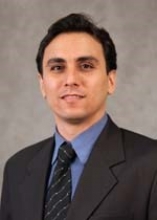CEE Seminar: Geotechnical Engineering Interfacing with Resilience, Climate Change & Energy: Critical Role of Multi-Physics Processes in Geomaterials

Assistant Professor
Civil & Environmental Engineering
Mississippi State University
Summary: Resilience, climate change and energy are considered among new world’s grand challenges, posing a new set of geotechnical engineering problems. There is a clear gap in the state of our knowledge in terms of quantitatively assessing the resilience of critical geotechnical infrastructure to extreme events under a changing climate. Further, increasing demands for exploring new sources of energy while reducing excessive CO2 emissions altogether have led to several emerging geo-energy technologies such as hydraulic fracturing, enhanced geothermal systems, carbon sequestration and energy piles. All of the aforementioned applications involve thermo-hydro-mechanical (THM) processes in variably saturated soils and fractured rocks. This seminar presents two examples to demonstrate how multiphysics modeling of geomaterials can be employed in a multidisciplinary setup to properly cope with these challenges. In the first example, a new analytical framework is presented to quantify changes in the shear strength of soils, a critical parameter that primarily governs the performance of natural slopes and engineered structures. The framework is then incorporated into a regional model to explore the impact of California’s drought on spatiotemporal variations in the shear strength under concurrent changes in soil moisture and temperature. In the second problem, a fully coupled THM numerical model was used for multiscale simulation of induced seismicity in carbon capture and storage (CCS) projects. CCS technology offers a promising solution to control and reduce CO2 emissions. However, concerns regarding induced seismicity associated with the technology needs to be properly addressed in order to obtain public acceptance and to prevent possible CO2 leakage from the storage site.
Bio: Vahedifard has been an assistant professor in the Department of Civil and Environmental Engineering at Mississippi State University (MSU) since August 2012. He received his doctorate in civil engineering (geotechnical) from the University of Delaware in 2011. He has about 15 years of academic and industry experience in the areas of geotechnical engineering and computational geomechanics. At MSU, Vahedifard served as PI/lead on several research projects with a total funding of over 2.4 million dollars supported by NSF, DOE, DOD and USACE, among others. He has authored/co-authored over 80 refereed articles in scholarly journals and conference proceedings. His projects and publications are primarily in the following areas: analytical and numerical methods in geomechanics, THM modeling of variably saturated soils and fractured rocks, resilience of geotechnical infrastructure to extreme events under a changing climate, THM modeling of CO2 injection for storage and utilization, remote sensing applications in geosystem assessment (e.g., levees), and terramechanics and off-road mobility modeling.



Share
Download
Upcoming Events
-
EECS 294 Seminar: Programming Light Diffraction for Information Processing and Computational Imaging
-
MAE 298 SEMINAR: Stretchable Electronics for Soft Biological and Robotic Systems
-
CBE Distinguished Lecture/CBE 298 Seminar: Computational Design of Peptides as Detectors, Sensors and Drugs
-
MSE 298 Seminar: Molecular Modeling in the Age of AI - From Energy Materials to Device Simulations
-
CBE 298 Seminar: Metal Electrodeposition for Modern Mineral Refining
